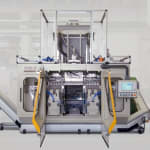 The "Tandem Blow" process developed by Bekum is increasingly proving to be an engine of efficiency. This process, first unveiled at the K1998, can point to an extremely successful market penetration after almost 10 years. The success of this technology ideally complements the trend towards small drinking yoghurt bottles, such as Actimel & Co.
The "Tandem Blow" process developed by Bekum is increasingly proving to be an engine of efficiency. This process, first unveiled at the K1998, can point to an extremely successful market penetration after almost 10 years. The success of this technology ideally complements the trend towards small drinking yoghurt bottles, such as Actimel & Co.The compact BM-series (BM 206 / 506) can be operated using the "Tandem Blow" process. The output from a single or twin machine can be doubled this way (i.e. an increase in capacity of 100%). The customer doesn't even need to order a new machine: this is also offered by Bekum as retrofitting. "Tandem Blow" signifies the simultaneous blow moulding of top and bottom, with its additional, so-called "bottom calibration". The process, according to information supplied by Bekum, cannot be provided with equivalent performance parameters by the competition. In terms of small drink bottles, "Tandem Blow" systems achieve an output of more than 100 million containers per year. The equipment is regarded as the reference in its class.
Increasing output using Multi Cavity
Small bottles for convenient consumption of milk-based drinks, sport drinks, juices and functional drinks for all age groups, with content ranging from 100 to 300 mL, are currently fashionable. The "Multi-Cavity" procedure used for this makes an even higher cavity density of the tools possible: a normal machine is equipped with a form width of 500 mm - a modified machine, such as the BM 506 DL (D= Double Station / L = Long Stroke), can accommodate forms with a width of up to 650 mm. This results in a cavity density up to 30% higher. There is a solution for almost every problem: the ,food containers can be manufactured in a single layer demonstrating the typical 3-layer structure of a milk container, or be equipped with a barrier layer and be coextruded in a 6-layer form.

With its twin-station blow moulder unit BM 506 DL for the 6-layer coextrusion process, the Berlin-based company integrates "Tandem Blow" technology into the multi-cavity production of co-extruded multilayer packaging. Due to the superb barrier properties of co-extruded multi-layer packaging, preventing oxygen and carbondioxide diffusion, the process is especially suitable for the production of packaging for long-life foodstuffs.
The market for small drink bottles is booming
"Tandem Blow" is currently bringing Bekum a steady flow of new orders. New systems for drinking yoghurt bottles, similar to the "Actimel" brand, are being delivered. The average production rate of the DM 506 DL is around 19,500 bottles per hour. In this case, Bekum even optimised the bottle weight in the wall thickness. The optimised "Actimel" bottles were subsequently tested for their fall properties, pressure resistance, and general mechanical properties. The results of the tests were more than convincing for the customer - and - compared to conventionally-manufactured bottles, economised on material by 25%. According to Bekum, the current market development is very pleasing.
The BEKUM group counts among the leading producers of blow-moulding equipment for plastic container packaging worldwide. The company offers complete production lines for soft drinks, mineral water, milk, cooking oil, vinegar, ground coffee, salt, pharmaceutical and cosmetic products, liquid soaps, detergents, paints, fuels and motor oils have been delivered to many countries all over the world.
BEKUM (Berliner Kunststoff Maschinen) was founded in Berlin in 1959. That same year, BEKUM developed and introduced the first ring neck calibration in the world - a technology still in use today by all machinery manufacturers. Numerous inventions and patents followed and showed that BEKUM's innovative and customer-accessible machines were always a step ahead of the times - this still holds true today. Our know-how from over 20,000 machines sold worldwide flows into all our customer requests.
Today 500 employees work for the BEKUM group in 5 plants around the world and generate a sales revenue of ? 65 million (2007).


